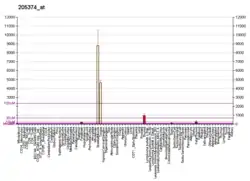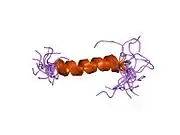Sarcolipin
Sarcolipin is a micropeptide protein that in humans is encoded by the SLN gene.[3][4]
Function
Sarcoplasmic reticulum Ca2+-ATPases are transmembrane proteins that catalyze the ATP-dependent transport of Ca2+ from the cytosol into the lumen of the sarcoplasmic reticulum in muscle cells. The SLN gene encodes a small transmembrane proteolipid that regulates several sarcoplasmic reticulum Ca2+-ATPases by reducing the accumulation of Ca2+ in the sarcoplasmic reticulum without affecting the rate of ATP hydrolysis.[4]
Ablation of sarcolipin increases atrial Ca2+ transient amplitudes and enhanced atrial contractility. Furthermore, atria from sarcolipin-null mice have blunted response to isoproterenol stimulation, implicating sarcolipin as a mediator of beta-adrenergic responses in atria.[5]
Sarcolipin is an important mediator of muscle based non shivering thermogenesis (NST). It causes the sarcoplasmic reticulum Ca2+-ATPases to stop pumping Ca2+ ions but continue futilely hydrolysing ATP, thus releasing the energy as heat.[6][7] Sarcolipin mediated heat production is very important for many organisms to maintain a warm body. In mammals thermogenesis by skeletal muscles is complemented by thermogenesis in the brown adipose tissue and beige adipose tissue. [8] Sarcolipin mediated heat production in contractile muscles helps endothermic fish like the opah heat its body. Some fishes like the billfishes have a specialised brain heater tissue that is derived from muscles that cannot contract but specialise in producing heat using sarcolipin.
References
- GRCh38: Ensembl release 89: ENSG00000170290 - Ensembl, May 2017
- "Human PubMed Reference:". National Center for Biotechnology Information, U.S. National Library of Medicine.
- Odermatt A, Taschner PE, Scherer SW, Beatty B, Khanna VK, Cornblath DR, et al. (November 1997). "Characterization of the gene encoding human sarcolipin (SLN), a proteolipid associated with SERCA1: absence of structural mutations in five patients with Brody disease". Genomics. 45 (3): 541–53. doi:10.1006/geno.1997.4967. hdl:2066/25426. PMID 9367679. S2CID 41989102.
- "Entrez Gene: SLN sarcolipin".
- Babu GJ, Bhupathy P, Timofeyev V, Petrashevskaya NN, Reiser PJ, Chiamvimonvat N, Periasamy M (November 2007). "Ablation of sarcolipin enhances sarcoplasmic reticulum calcium transport and atrial contractility". Proceedings of the National Academy of Sciences of the United States of America. 104 (45): 17867–72. Bibcode:2007PNAS..10417867B. doi:10.1073/pnas.0707722104. PMC 2077025. PMID 17971438.
- Bal NC, Periasamy M (March 2020). "Uncoupling of sarcoendoplasmic reticulum calcium ATPase pump activity by sarcolipin as the basis for muscle non-shivering thermogenesis". Philosophical Transactions of the Royal Society of London. Series B, Biological Sciences. 375 (1793): 20190135. doi:10.1098/rstb.2019.0135. PMC 7017432. PMID 31928193.
- Legendre LJ, Davesne D (March 2020). "The evolution of mechanisms involved in vertebrate endothermy". Philosophical Transactions of the Royal Society of London. Series B, Biological Sciences. 375 (1793): 20190136. doi:10.1098/rstb.2019.0136. PMC 7017440. PMID 31928191.
- Reilly SM, Saltiel RA (22 October 2015). "A Futile Approach to Fighting Obesity?". Cell. 163 (3): 539–540. doi:10.1016/j.cell.2015.10.006. PMID 26496598. S2CID 10336243.
- Asahi M, Sugita Y, Kurzydlowski K, De Leon S, Tada M, Toyoshima C, MacLennan DH (April 2003). "Sarcolipin regulates sarco(endo)plasmic reticulum Ca2+-ATPase (SERCA) by binding to transmembrane helices alone or in association with phospholamban". Proceedings of the National Academy of Sciences of the United States of America. 100 (9): 5040–5. Bibcode:2003PNAS..100.5040A. doi:10.1073/pnas.0330962100. PMC 154294. PMID 12692302.
- Asahi M, Kurzydlowski K, Tada M, MacLennan DH (July 2002). "Sarcolipin inhibits polymerization of phospholamban to induce superinhibition of sarco(endo)plasmic reticulum Ca2+-ATPases (SERCAs)". The Journal of Biological Chemistry. 277 (30): 26725–8. doi:10.1074/jbc.C200269200. PMID 12032137.
Further reading
- Lanfranchi G, Muraro T, Caldara F, Pacchioni B, Pallavicini A, Pandolfo D, et al. (January 1996). "Identification of 4370 expressed sequence tags from a 3'-end-specific cDNA library of human skeletal muscle by DNA sequencing and filter hybridization". Genome Research. 6 (1): 35–42. doi:10.1101/gr.6.1.35. PMID 8681137.
- Odermatt A, Becker S, Khanna VK, Kurzydlowski K, Leisner E, Pette D, MacLennan DH (May 1998). "Sarcolipin regulates the activity of SERCA1, the fast-twitch skeletal muscle sarcoplasmic reticulum Ca2+-ATPase". The Journal of Biological Chemistry. 273 (20): 12360–9. doi:10.1074/jbc.273.20.12360. PMID 9575189.
- Smith WS, Broadbridge R, East JM, Lee AG (January 2002). "Sarcolipin uncouples hydrolysis of ATP from accumulation of Ca2+ by the Ca2+-ATPase of skeletal-muscle sarcoplasmic reticulum". The Biochemical Journal. 361 (Pt 2): 277–86. doi:10.1042/0264-6021:3610277. PMC 1222307. PMID 11772399.
- Mascioni A, Karim C, Barany G, Thomas DD, Veglia G (January 2002). "Structure and orientation of sarcolipin in lipid environments". Biochemistry. 41 (2): 475–82. doi:10.1021/bi011243m. PMID 11781085.
- Asahi M, Kurzydlowski K, Tada M, MacLennan DH (July 2002). "Sarcolipin inhibits polymerization of phospholamban to induce superinhibition of sarco(endo)plasmic reticulum Ca2+-ATPases (SERCAs)". The Journal of Biological Chemistry. 277 (30): 26725–8. doi:10.1074/jbc.C200269200. PMID 12032137.
- Minamisawa S, Wang Y, Chen J, Ishikawa Y, Chien KR, Matsuoka R (March 2003). "Atrial chamber-specific expression of sarcolipin is regulated during development and hypertrophic remodeling". The Journal of Biological Chemistry. 278 (11): 9570–5. doi:10.1074/jbc.M213132200. PMID 12645548.
- Asahi M, Sugita Y, Kurzydlowski K, De Leon S, Tada M, Toyoshima C, MacLennan DH (April 2003). "Sarcolipin regulates sarco(endo)plasmic reticulum Ca2+-ATPase (SERCA) by binding to transmembrane helices alone or in association with phospholamban". Proceedings of the National Academy of Sciences of the United States of America. 100 (9): 5040–5. Bibcode:2003PNAS..100.5040A. doi:10.1073/pnas.0330962100. PMC 154294. PMID 12692302.
- Suzuki Y, Yamashita R, Shirota M, Sakakibara Y, Chiba J, Mizushima-Sugano J, et al. (September 2004). "Sequence comparison of human and mouse genes reveals a homologous block structure in the promoter regions". Genome Research. 14 (9): 1711–8. doi:10.1101/gr.2435604. PMC 515316. PMID 15342556.
- Rual JF, Venkatesan K, Hao T, Hirozane-Kishikawa T, Dricot A, Li N, et al. (October 2005). "Towards a proteome-scale map of the human protein-protein interaction network". Nature. 437 (7062): 1173–8. Bibcode:2005Natur.437.1173R. doi:10.1038/nature04209. PMID 16189514. S2CID 4427026.
- Vittorini S, Storti S, Parri MS, Cerillo AG, Clerico A (2007). "SERCA2a, phospholamban, sarcolipin, and ryanodine receptors gene expression in children with congenital heart defects". Molecular Medicine. 13 (1–2): 105–11. doi:10.2119/2006-00054.Vittorini. PMC 1869624. PMID 17515962.




